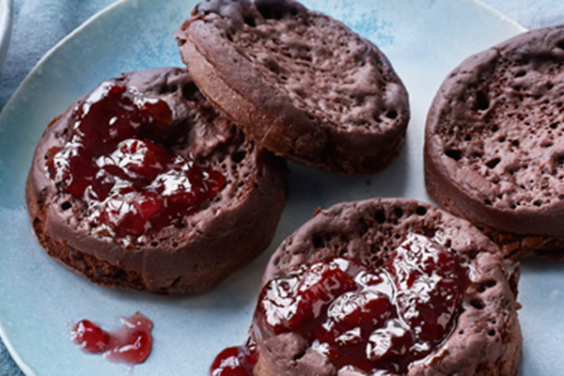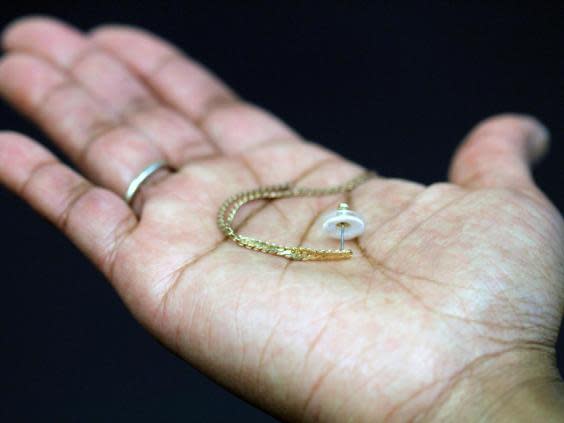Lifestyle Barometer: Your guide to what’s hot and what’s not this week from religious marriage to CBD
GOING UP ▲

▲ Chocolate crumpets
Fans of The Great Celebrity Bake Off were left divided on Tuesday night after judge Paul Hollywood asked contestants on the show to create “six chocolate crumpets with a rich black cherry jam”.
A twist on the classic teatime treat, Hollywood’s version left the celebrities – including Jeremy Paxman, comedian Joe Wilkinson, Coronation Street star Sally Lindsay and former queen of the jungle Georgia Toffolo – in a state of confusion.
Viewers at home were equally perplexed. While some were disgusted by the thought of a sweet crumpet, others wondered why they had never come across them before now.
“Gimme gimme gimmeeeeeee a chocolate crumpet,” one person wrote on Twitter.
Another added: “Why have I never had a chocolate crumpet before??? Where do I buy them?”
The bad news is that chocolate crumpets are surprisingly elusive in supermarkets so the only way you’re going to get to try one is by making them yourself.
Luckily, Hollywood has shared his secret recipe to creating the perfect chocolate crumpets and accompanying black cherry jam. Read more here.

▲ New contraceptives
This week it was announced that two types of contraceptive are being tested as new forms of birth control: contraceptive jewellery and the male pill.
Researchers at the University of Washington brought the development of the male contraceptive pill one step closer to reality after a trial found that the capsule was able to limit the activity of sperm with few side effects.
The study found drug side effects were mild and included fatigue, acne or headache in four to six men each.
Five men also reported a mildly decreased sex drive, while an additional two men described mild erectile dysfunction, however sexual activity was not decreased.
None of the participants stopped taking the drug because of the side effects, and all passed safety tests.
This was shortly followed by the news that researchers from the Georgia Institute of Technology have developed a technique for administering contraceptive hormones through backings that have been placed on items of jewellery.
The patches that contain the hormones are placed on the area of the jewellery most likely to come into contact with the skin, such as the back of an earring or behind the face of a watch.

▲ CBD
US pharmacy chain Walgreens has become the latest company to start selling cannabidiol (CBD) products.
A spokesperson for the retailer revealed that Walgreens is launching the range of CBD products in nearly 1,500 of its stores and will include everything from creams to patches and sprays.
Walgreens will sell the products in select states, including Oregon, Colorado, New Mexico, Kentucky, Tennessee, Vermont, South Carolina, Illinois and Indiana.
“This product offering is in line with our efforts to provide a wider range of accessible health and wellbeing products and services to best meet the needs and preferences of our customers,” Brian Faith, a spokesperson for the company, told CNBC on Wednesday.
As CBD continues to surge in popularity, more and more retailers are beginning to produce their own cannabis-derived products.
Earlier this month, David Klein, who invented the original Jelly Belly bean in 1976, revealed that he has created a new line of “gourmet” CBD-infused jelly beans, which are being sold through his company Spectrum Confections.
Similarly, luxury department store Barneys announced plans to open a cannabis lifestyle and wellness section inside its Beverly Hills store.

▲ Gin
The UK’s love-affair with gin has seen sales hit an all-time high.
According to the Wine and Spirit Trade Association (WSTA), a record 73 million bottles of the juniper-based drink were sold in Britain in 2018.
The organisation said sales had seen a “staggering” boost, breaking £2bn and almost doubling since 2016.
The figures also revealed that sales of gin in the past two years had peaked in March, suggesting that it is a popular gift for Mother’s Day.
Between January and March 2017, gin sold in UK supermarkets and shops reached 6.4m bottles, of which 2.6m (41 per cent) were sold in March.
The same period in 2018 saw this number rise to 52 per cent of bottles being sold in March.
▲The Face

Some 15 years after it folded, The Face magazine is making a comeback.
A publication that was founded in 1980, The Face became recognised as one of the most influential cultural authorities in Britain for everything from fashion and film to music and nightlife.
On Monday, an Instagram account was created for the new title and although it has only been teasing out short clips and images of the logo so far, it’s already garnered more than 6,000 followers.
The new editor of The Face is Stuart Brumfitt, a former editorial director of Vice Media’s Amuse, a premium travel website.
The rest of the team has yet to be announced, but The Face has already recruited a number of part-time contributors, who include British fashion designer Grace Wales Bonner, music executive Grace Ladoja and photographer Margaret Zhang.
GOING DOWN ▼
▼ Religious marriages

Figures released by the Office for National Statistics have revealed that the number of religious marriages in the UK has hit an all-time low.
For the first time ever, fewer than a quarter (24 per cent) of all marriages in 2016 were religious ceremonies, the data shows.
The figures also revealed that there were just 60,069 religious marriages in 2016, falling by 4.1 per cent from the previous year and by nearly half (48 per cent) from two decades ago.
The ONS claims that this is partly due to the long-term decline in the overall number of marriages – marriage rates for opposite-sex couples in 2016 were lower at all ages compared with 2006 – but also the rise in popularity of civil marriage ceremonies.
Since 1992, civil marriages have increasingly outnumbered religious marriages every year.
The ONS figures also revealed that the number of same-sex couples who chose to have a civil marriage increased by 3.6 per cent compared with 2015, while those who chose to have a religious marriage declined by 4.2 per cent.
▼ Plastic pollution

Environmental charity Greenpeace has criticised Sainsbury’s for failing to reduce the amount of plastic waste it produces.
The UK’s second biggest supermarket was targeted by Greenpeace after it was found to be “the worst in class” in a 2018 survey of retailer’s plastic policies.
According to Greenpeace, Sainsbury’s has made the least progress out of the top 10 UK supermarkets, pledging to cut just 77 tonnes of plastic packaging, compared to Asda’s 6,500 tonnes and Morrison’s 3,766 tonnes.
However, Sainsbury’s has hit back at the claims stating that it will reduce plastic by well over 2,400 tonnes in the next 12 months alone.
You can read more about how UK supermarkets are tackling plastic pollution and food waste here.
▼ Working lunches

More than a third of British workers don’t leave their desks during lunchtime, new research has revealed.
According to a new study of 1,000 British workers, just 24 per cent of office staff always take their lunch break.
Meanwhile, 34 per cent work through their lunch every single day.
This is despite government guidelines which state that employees are entitled to a 20-minute break during their working day if they work for more than six hours.
The study also found that the average employee only manages to get through around three hours of work every day.
Five hours of the working day is spent doing activities not related to their work, including chatting with colleagues, shopping online and making batches of tea.
▼ Dominos

This week a vegan activist criticised Domino’s after she found meat “hidden” underneath the toppings of her pizza.
JayJay Palmer, 26, accused the pizza chain of deliberately “sabotaging” her meal, which she’d ordered from the Spennymoor, County Durham branch, in a review on its Facebook page.
“Me and my partner made an order and made it very clear I’m vegan,“ she wrote.
“When the pizza was delivered It had bits of chicken sliced and hidden UNDER THE DOUGH with sauce on the top to try and hide.
“And they had hidden little bits of sausage that they had chopped into to smaller bits and tucked under the mushroom!”
Palmer explained that she spoke to the branch manager who apologised and offered her a refund and a free meal but went on to argue that vegans are often not taken seriously by food professionals.
“I understand that most people don’t understand veganism or are against us (especially chefs), but I’d never treat anyone like that, to go out of their way to sabotage me is just disgusting,” she told The Independent.
▼ Home renovations

Nearly one in 10 British couples who have attempted to renovate a house together have split up during the progress, a new study has found.
A nationwide survey of 2,000 homeowners has revealed that 10 per cent of British couples who have renovated their home almost separated, while 7 per cent actually did.
What’s more, 77 per cent of those surveyed said the project led to “furious rows”, with 15 per cent claiming they were “constantly at each other’s throats”.
In fact, more than half (58 per cent) of people who had bought a house in need of renovations said their relationship was so affected that they would never consider doing it again.
The research, conducted by www.MyBuilder.com – an online marketplace that brings builders and homeowners together – also revealed that couples considered renovating a home as “one of the most stressful things in life”, ahead of having a baby, getting divorced or taking exams.
















